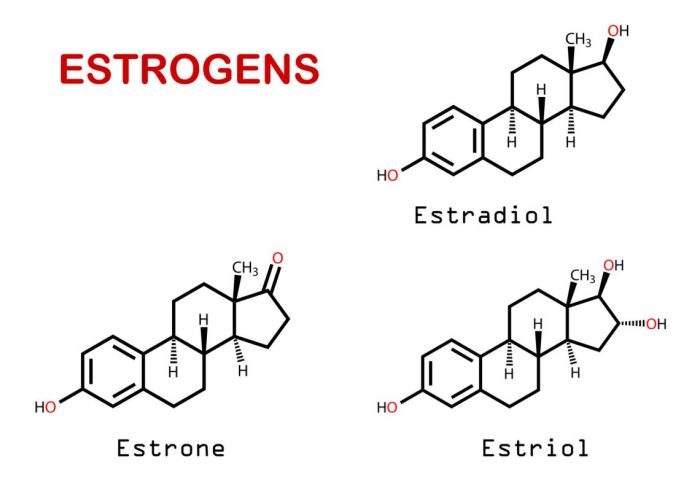
What is Estrogen Dominance?
You may read elsewhere that estrogen dominance means you have too much estrogen. That’s only partially true. Sometimes, it is that you have high estrogen. But, more often, it is having relatively more estrogen than one or more of the other hormones that should be available to balance it. These include progesterone, DHEAs, and testosterone. Also, there are environmental pollutants that can act like estrogen. These are called xenoestrogens. They bind to estrogen receptors and cause excess estrogen-like activity.
What are the symptoms of Estrogen Dominance?
While you need a certain level of estrogen, too much of a good thing can cause symptoms like:
- PMS – sad, emotional, weepy crying type PMS
- Breast tenderness
- Headaches or Migraines
- Uterine fibroids
- Uterine polyps
- Acne
- Heavy periods
- Painful periods
- Hormone-related conditions of the ovaries, uterus or breast
- Endometriosis
- Anxiety or depression
- Weight gain
Is there an Estrogen Dominance test?
Well, now that depends. There is a blood test for one form of estrogen (estradiol). But did you know that estradiol is only one of 3 primary forms of estrogen in your body? The other two are estrone and estriol. These are not usually measured on blood tests. So, your estradiol blood test may return perfectly normal, but there may still be estrogen dominance.
Even if your estradiol blood test is normal, it depends on how the other reproductive hormones are faring and how active your estrogen is. This is regulated by a protein called sex hormone-binding globulin (SHBG).
Which Hormones Should I Test?
If you want to have your hormone levels tested, a full hormone blood test panel would include:
- total testosterone
- DHEAs
- androstenedione
- progesterone level (best measured on day 21 IF your cycles are regularly 28 days)
- SHBG
- estradiol (on days 3 and 14 of a cycle)
- LH and FSH (day 3)
- prolactin
- dihydrotestosterone
To interpret them accurately, certain hormones must be tested at specific points in your menstrual cycle. There may only be subtle shifts in these hormones that your doctor considers normal. But, those subtle shifts are sometimes enough to cause the above symptoms. Even if all the blood tests are normal, we still have the unknowns of estrone and estriol and several other forms of estrogen.
With the above symptoms, I often help the liver with estrogen metabolism, regardless of blood test results. However, I always like to see the exact numbers as well.
What About a Saliva Test for Estrogen?
You can take a 30-day series of saliva samples to track estrogen throughout your cycle. This helps determine whether estrogen rises or falls as it should throughout the cycle. However, it is an expensive test and is not covered by OHIP. I find serum tests for estrogen sufficient and are covered by OHIP.
What about a DUTCH test or urine test for hormones?
DUTCH tests provide extensive information about all of your hormones. It also tells you about how well you are breaking these hormones down. This is also an expensive test and is not covered by OHIP. It may be covered by your employee health benefits, though.
How do you treat Estrogen Dominance?
To efficiently process extra estrogen for disposal, your liver requires specific nutrients in specific forms. It does not require dandelion or milk thistle, which are the constituents of many liver detox kits. It does require 5-methyltetrahydrofolate, pyridoxal-5-phosphate, indole-3-carbinol, methylcobalamin, n-acetylcysteine, glutathione, and calcium-d-glucarate. These are all-natural substances, but almost none are found in health food store liver detox kits. I would use these types of treatments to enhance liver detoxification generally. They also ensure complete and efficient estrogen metabolism.
Helping the liver has dramatically improved the above-mentioned symptoms. This improves the metabolism of excess estrogen and xenoestrogens (chemical pollutants like BPA that can act like and be even more powerful than estrogen).
For help with this or any other health problem, book an appointment here or call the office for more information at 416-481-0222.
Authored by Dr. Pamela Frank, BSc(Hons), ND, updated April 3, 2025
Dr. Pamela has practiced as a naturopathic doctor in Toronto since 1999. She has received numerous “Best Naturopath in Toronto” awards. She is registered with the College of Naturopaths of Ontario.
Dr. Pamela Frank uses a natural treatment approach that may include acupuncture, herbal medicine, nutrition, diet, vitamins, supplements, and other natural remedies to restore balance and provide long-term resolution to almost any health problem.
